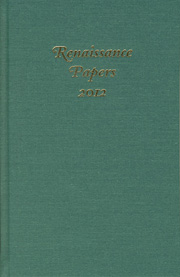Book contents
- Frontmatter
- Contents
- Dedication
- Reconstructing the Bower of Bliss: Homoerotic Myth-Making in The Faerie Queene
- Ovid, Lucretius, and the Grounded Goddess in Shakespeare's Venus and Adonis
- The Soul as Commodity: Materialism in Doctor Faustus
- Antipholus and the Exorcists: The Acts of the Apostles in Shakespeare's The Comedy of Errors
- Paul's Cross Churchyard and Shakespeare's Verona Youth
- The Summoning of Hamlet and Lear
- “Bred Now of Your Mud”: Land, Generation, and Maternity in Antony and Cleopatra
- Cosmetic Blackness: East Indies Trade, Gender, and The Devil's Law-Case
- From One Marvell to Another: Puritan Logic in “To His Coy Mistress”
- “An Heap Is Form'd into an Alphabet”: Thomas Blount's Sociable Lexicography
- Getting Past the Ellipsis: The Spirit and Urania in Paradise Lost
Getting Past the Ellipsis: The Spirit and Urania in Paradise Lost
Published online by Cambridge University Press: 05 December 2013
- Frontmatter
- Contents
- Dedication
- Reconstructing the Bower of Bliss: Homoerotic Myth-Making in The Faerie Queene
- Ovid, Lucretius, and the Grounded Goddess in Shakespeare's Venus and Adonis
- The Soul as Commodity: Materialism in Doctor Faustus
- Antipholus and the Exorcists: The Acts of the Apostles in Shakespeare's The Comedy of Errors
- Paul's Cross Churchyard and Shakespeare's Verona Youth
- The Summoning of Hamlet and Lear
- “Bred Now of Your Mud”: Land, Generation, and Maternity in Antony and Cleopatra
- Cosmetic Blackness: East Indies Trade, Gender, and The Devil's Law-Case
- From One Marvell to Another: Puritan Logic in “To His Coy Mistress”
- “An Heap Is Form'd into an Alphabet”: Thomas Blount's Sociable Lexicography
- Getting Past the Ellipsis: The Spirit and Urania in Paradise Lost
Summary
In John Shawcross's book The Development of Milton's Thought: Law, Religion, and Government, he quotes that famous phrase from Milton, “fit audience, though few.” I was brought up short while reading because this quotation does not include an ellipsis. Can even Shawcross nod? I was reassured when I realized that he had not cited book and line numbers for the quotation; he was simply quoting an oft-used phrase rather than Paradise Lost itself. I thus felt better about John, but continued to be troubled by the broader implications of “fit audience … though few,” with or without the ellipsis. Here I shall argue that the ellipsis eliminates a central element, in the line and the poetic sentence and in terms of Milton's own concerns about the fate of his text. And what scholars so often omit by typifying Milton's audience using this phrase is the place of the ineffable Spirit of God in the communion or community of believers.
I shall dispense with the simple part first: how often is the ellipsis used, and what does it skate over? The phrase appears in the invocation to Book 7 of Paradise Lost:
Standing on Earth, not rapt above the Pole,
More safe I Sing with mortal voice, unchang'd
To hoarse or mute, though fall'n on evil days,
On evil days though fall'n, and evil tongues;
In darkness, and with dangers compast round,
And solitude; yet not alone, while thou
Visit'st my slumbers Nightly, or when Morn
Purples the East: still govern thou my Song,
Urania, and fit audience find, though few.
(7.23–31)- Type
- Chapter
- Information
- Renaissance Papers 2012 , pp. 117 - 125Publisher: Boydell & BrewerPrint publication year: 2013



